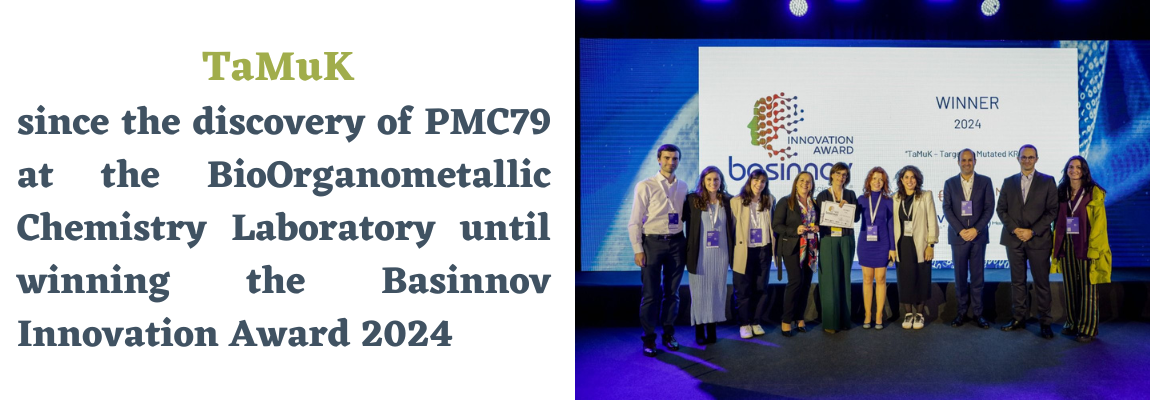The BioOrganometallic Chemistry Group, led by Maria Helena Garcia, stood out as a pioneer in the development of ruthenium-based compounds (Ru-cyclopentadienyl; RuCp) with innovative applications in oncological therapies. Potential ruthenium metallo-pharmaceuticals, in addition to constituting important alternatives to platinum medications known for their serious side effects, have proven to be so innovative that they have exceeded all expectations.
Andreia Valente joined this dynamic team with a project that would culminate, in 2021, in the co-founding with Maria Helena Garcia of R-nuucell. This biotechnology Ciências‘ spin-off develops potential medicines, using RuCp as a common platform, for the treatment of metastatic cancers. Among them, triple-negative breast cancer stands out, for which R-nuucell’s potential drug is protected by an internationally granted patent.
TaMuK: Targeting Mutated KRAS project, led by Andreia Valente, brought to light a compound, PMC79, capable of inhibiting at least three of the most common mutations in the KRAS protein. Mutations in this protein are present in around 30% of all cancers, making it an extremely important therapeutic target.
Preceding this discovery, there was in-depth multi-year research work within CQE@Ciências in which, together with several partners, the anti-cancer activity of PMC79 was uncovered in ovarian and breast cancer models. PMC79 was also tested in zebrafish and proved to be safe, and one of its targets was validated to be the cell’s cytoskeleton.
In collaboration with Professor Ana Preto from the University of Minho, the full potential of PMC79 was disclosed. When the study of the effect of metallo-pharmaceuticals from the BioOrganometallic Chemistry Group on colorectal cancer was initiated, the mutation in the KRAS protein was still considered untargetable. With great surprise, the team discovered that among the small batch of the most effective PMCs sent for testing, there was one that showed unparalleled potential in several mutations of this protein, PMC79, which led to the submission of an international patent.
And from there, things just took off Several students contributed to the advancement of this technology, both at CQE@Ciências, with the optimization of the drug potential and its formulation for in vivo administration, and at the Center for Molecular and Environmental Biology, where, under the guidance of Professor Ana Preto, several in vitro studies in different cancer models with KRAS mutation were performed. Later, Doctor Paulo Costa (BioISI, FCUL) joined the team and helped to understand, through molecular modeling studies, the type of interaction between PMC79 and the several KRAS mutations, and Doctor Cristina Fillat (Institut d ‘Investigacions Biomèdiques August Pi I Sunyer, Spain) was crucial to obtain the in vivo proof of concept for pancreatic cancer, in which the mutation in KRAS reaches 90%.
In November, TaMuK was awarded the Basinnov Innovation Award 2024, an initiative designed to reward projects with exceptional scientific quality and significant therapeutic potential in biotechnology and biomedicine with a special focus on oncology and immunotherapies. They were awarded 20.000€ in prize money along with mentoring services. In the future, PMC79 may be integrated into the pipeline of potential drugs that R-nuucell is developing.
We couldn’t be happier and will keep an eye on both TaMuK and R-nuucell.
Will there be another Promising Metal Compound (PMC) soon?






